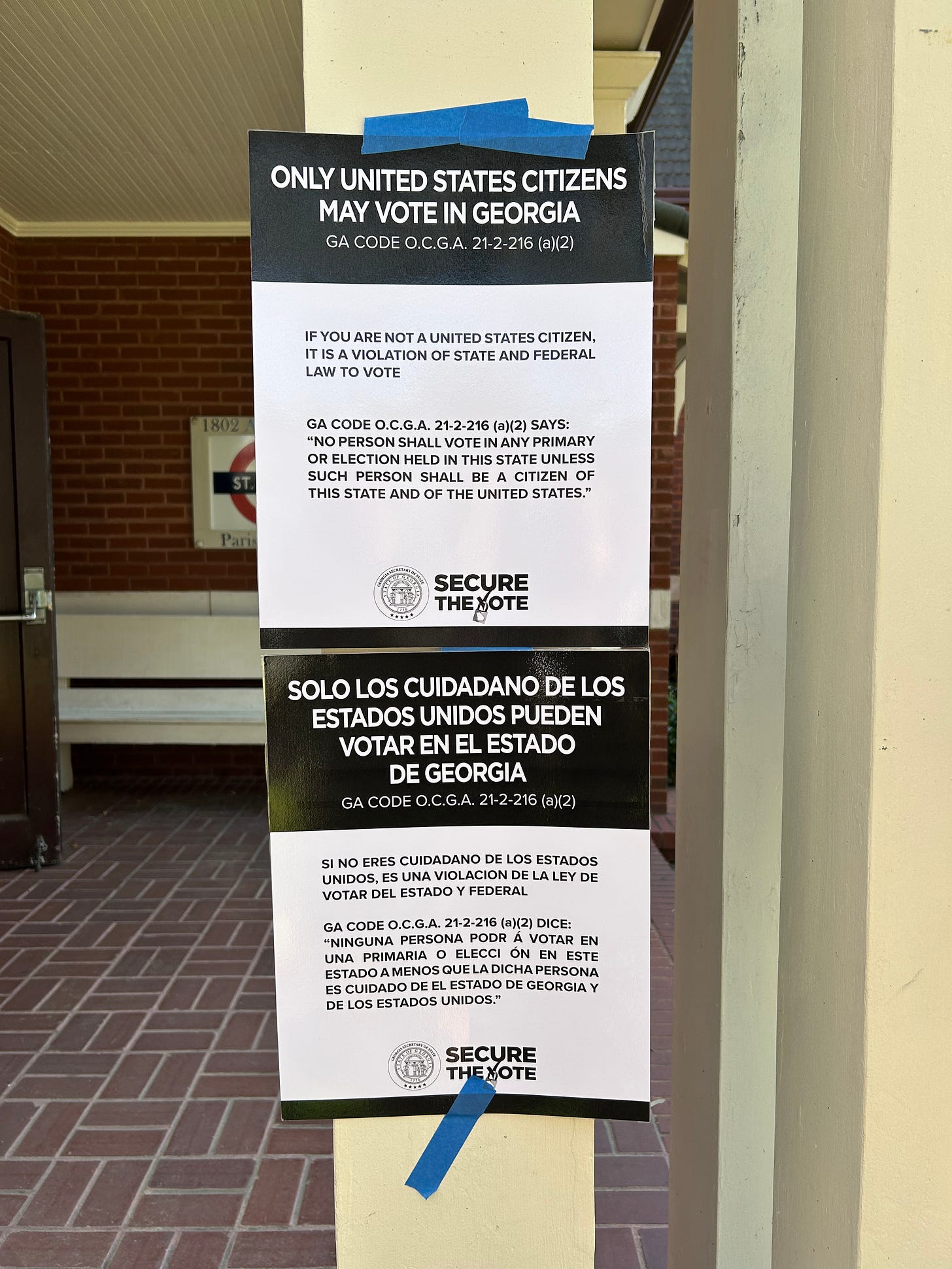Overloading the system and punishing opposition
It starts with Venezuelan bad guys and ends with, well, history tells us where this ends.
The Trump administration, Elon Musk’s DOGE, and congressional Republicans are moving with incredible speed and ferocity not just to reshape the U.S. government, but to fundamentally alter American society.
I know this because I’m in the weeds of it every day, trying to keep up with a relatively small subset of the Trump administration’s priorities — immigration and Social Security. It has been difficult to get through a few hours’ worth of writing a story — like the one I’ll have out tomorrow at Rolling Stone that details the dangers of DOGE’s access to Social Security data — without having to update some of the copy I’ve just written because there has been a development in a lawsuit, a source has provided additional information, the White House has issued a new executive order, or new leaks have emerged from within a government agency.
All of this is setting up a series of ultimate tests for the framework of democracy that the founders constructed at the country’s founding. So far, the Trump administration, Musk and congressional Republicans are winning — even if everyday Americans don’t see the military marching down their streets. The Trump administration is fighting in court on myriad fronts to uphold its policies and its assault on the constitution. As a result, the White House and a slew of federal agencies have ignored judicial orders, setting up likely Supreme Court battles as our constitutional crisis grows by the day.
Last week, the Trump regime ignored due process by deporting what it says were members of the Venezuelan Tren de Aragua gang to a Salvadoran prison. Then, the regime ignored a judge’s order to halt the deportations. Government attorneys have now admitted that some of the men deported to El Salvador did not have criminal records, as the White House had initially said. (Stunningly, government attorneys argued they were justified in deporting the migrants because they might have committed crimes in the future if allowed to stay in the United States.)
The deportations are just a part of an even larger power grab exhibited by the Trump administration’s invocation of the Alien Enemies Act of 1798 — which has only been used three times in American history, during the War of 1812, World War I and World War II — to justify ignoring the men’s right to due process and deporting them to a foreign prison.
The Trump administration’s application of the Alien Enemies Act to members of Tren de Aragua is part of a broader pattern of labelling anyone opposed to the regime’s actions an enemy — and not just in the political, we’re going to beat them in the next election sense. No, the use of the Alien Enemies Act signals a willingness to suspend the constitutional rights of anyone the Trump administration decides is an enemy. This means any American that disagrees with the regime’s policies — members of the Democratic party and other political opponents, judges, journalists, whistleblowers, minority groups and more — all are now subject to a draconian interpretation of law that holds anyone deemed an enemy to the regime’s power can be detained or deported.
This is already occurring. Agence France-Press reports that a French researcher was detained by DHS and eventually deported after agents read the researcher’s text messages and determined they amounted to “hatred of Trump [that could be] described as terrorism.”
The Trump administration knew it could get away with ignoring due process when it came to the men it deported last week. Cabinet members and congressional Republicans have coalesced around the talking points that no one should be opposed to deporting violent criminals — just take a look at Rep. Tim Burchett’s (R-Tn.) performance on CNN on Tuesday morning. Burchett resorted to the time-tested strategy of accusing CNN anchor John Berman of “taking the side of a bunch of murderers.” Anyone who lived through 9/11 and the Global War on Terror will recall this line of attack. Back then, a politically diverse coalition of Americans banded together in opposition to the Patriot Act — another constitutionally questionable use of the nation’s defense and intelligence communities by a Republican president, employed to go after a different, much less vague, enemy group.

***
But this is simply where things start. It begins with Venezuelan bad guys and, if left unchecked, ends with anyone the regime wants to punish. By citing the Alien Enemies Act in relation to a group — Tren de Aragua — that does not resemble anything like an invading army, the Trump administration is setting up an argument that it can lock up anyone it deems an enemy of the United States, which is to say, Trump’s own power. You can imagine where that will end up.
It’s not hyperbole to say how bad this can all get, and you don’t have to take my word for it. The Wall Street Journal editorial board criticized Trump’s application of the Alien Enemies Act, noting that we are not, in fact, at war with Tren de Aragua.
“Mr. Trump says we’re at war with the gangs so the law is appropriate, but there has been no declaration of war or resolution from Congress to that effect,” the editorial board wrote on Monday.
The judge who sought to halt Trump’s deportation of the men to the Salvadoran hellhole run by the country’s strongman president, Nayib Bukele, is now under attack by the entirety of the American right. Trump and Musk have called for the judge, James Boasberg, to be impeached. Congressional Republicans quickly heeded this call and introduced articles of impeachment. This, too, puts us on a precarious path to authoritarianism: with Congress not acting as a check on the Trump administration in any meaningful way, it’s now up to the courts to judge the regime’s interpretations of various laws in deciding whether what the White House is doing is legal or not. If Trump can simply remove judges who hand down rulings he doesn’t like, this is no longer a constitutional republic. Instead, it’s something that looks much more like Bukele’s El Salvador.
Arturo Dominguez at Decolonized Journalism points out that it’s not just Bukele’s strongman ethos that Trump would like to recreate. Bukele has led a crackdown on El Salvador’s gangs and criminals that, while effective, has also resulted in widespread human rights violations. Bukele’s crackdown has been made possible by a two-year period of martial law that the country is still under as its president targets critics and arrests thousands, while his “popularity holds because the country is much safer than it once was,” Dominguez writes.
That’s Trump’s play here: deport allegedly violent migrants by any means possible, then convince enough Americans that the suspension of some laws, rules and norms aren’t a big deal because Trump is protecting us. Meanwhile, the regime continues to ramp up the military’s involvement in immigration matters, sending the USS Gravely, a destroyer, to the Gulf of Mexico, to assist with immigration enforcement and drug interdiction, according to the Defense Department.
Skirting of constitutional norms, deployment of troops to the border, a destroyer in the Gulf, banishment of migrants — some of whom aren’t even criminals — to a foreign prison, and now, government attorneys arguing that the Trump administration can’t share more information about the deportation of the alleged Tren de Aragua members with Judge Boasberg because they fall under state secrets provisions of U.S. law.
Having to release information about the flights that took the Venezuelan migrants to El Salvador "would unquestionably create serious repercussions for the Executive Branch's ability to conduct foreign affairs," Justice Department lawyers said in a court filing on Wednesday.
How far will the Trump administration take it and will this work? We’re about to find out.
***
The speed with which all of this is happening is testing the systems meant to protect us from authoritarian power grabs. It’s not just difficult for courts and Democratic elected officials to keep up with — the unending flow of developments from Washington can be a challenge for even the most experienced reporters and well-staffed newsrooms to stay on top of. It is unmanageable and unsustainable, but that is the point. To help support my work staying on top of all this madness — let alone breaking news about it, like my recent stories on Social Security for Rolling Stone, please consider a paid subscription to American Doom or dropping a few dollars in our Coffee Fund.
Keep reading with a 7-day free trial
Subscribe to American Doom to keep reading this post and get 7 days of free access to the full post archives.





